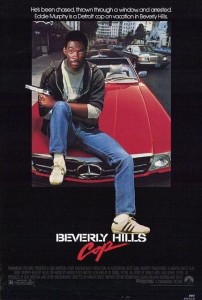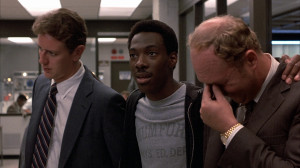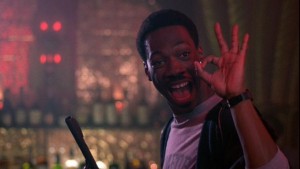Everything Coming to Now Playing Podcast in December 2020

It’s been a long and exhausting year, but Now Playing Podcast is leaving 2020 on a positive note, with nineall-new episodes for listeners and supporters. It’s a good thing December has 31 days.
Here’s everything coming to Now Playing Podcast in December 2020.
December 1 – 48 Hrs.
December was supposed to be the month of Eddie Murphy, with our hosts taking their first real deep dive into the actor/comedian/singer/GOAT’s filmography. But now that Amazon has moved the Coming to America sequel to March, it’s going to be the “half-month” of Murphy. Now Playing kicks things off December 4 with a review of 1982’s 48 Hrs. Directed by Walter Hill and co-starring Nick Nolte, this was the film that launched Murphy’s film career and gave audiences a glimpse at the star beyond Saturday Night Live. Let’s see how some of the movie’s rougher edges hold up with modern audiences.
December 4 – Rosemary’s Baby
Roman Polanski’s classic horror tale headlines the Gold Level of Now Playing’s 2020 Fall/Winter Donation Series. Rosemary’s Baby follows Mia Farrow’s expectant mother, who fears a satanic cult is after her baby. The film is recognized as a hallmark of the art-horror genre, spawning a television film sequel and a 2014 remake.
December 8 – Another 48 Hrs.
Eddie Murphy and Nick Nolte got back together in 1990 for a sequel to their first team-up. Another 48 Hrs. arrived at a time when sequels were experimenting with titles that didn’t involve numbers. That’s how we got movies like Another Stakeout and Teen Wolf Too. There was even a made-for-TV sequel to Splash called Splash, Too.
December 11 – Look What’s Happened to Rosemary’s Baby
Speaking of made-for-TV sequels, a very loosely connected sequel dubbed Look What’s Happened to Rosemary’s Baby premiered on ABC in October 1976. This time, it’s Patty Duke in the lead role. While the first Rosemary’s Baby has been enshrined in the National Film Registry by the Library of Congress, the sequel has been uploaded to YouTube. You can watch through the link below and ready yourself for the review on December 11.
December 15 – Stephen King’s Golden Years
Now Playing makes a quick pivot back to its long-running Stephen King retrospective on December 15, with a review of 1991’s CBS miniseries, Stephen King’s Golden Years. It’s about a man named Harlan Williams – not the comic actor Harland Williams – who realizes he’s aging in reverse. The miniseries ran for seven episodes in the summer, so you’re forgiven if you’ve never heard of it.
December 18 – Rosemary’s Baby (2014)
NBC tried to reinvent Rosemary’s Baby with a two-part, four-hour adaptation that aired during the 2014 May “sweeps” ratings period. This time, Zoe Saldana takes over the Rosemary role, with Patrick J. Adams and Jason Isaacs also on board. The miniseries wasn’t a ratings or critical hit, but our hosts will give it another look on December 18.
December 22 – Tenet
At last, Now Playing gets a chance to review one of the many would-be blockbusters that got pushed back by the pandemic. Tenet got a theatrical release in September, but with so many theaters closed it failed to meet expectations in the U.S. It’s hitting disc and digital on December 15, so all of our hosts will have a chance to watch and review it.
December 25 – Trading Places
It will truly be a happy and merry Christmas when the Now Playing review of Trading Places arrives on December 25. The 1983 comedy further solidified Eddie Murphy’s reputation as a box office draw and helped Jamie Lee Curtis break away from “scream queen” roles she’d been stuck playing since Halloween. The Trading Places review will be released exclusively for Now Playing’s Podbean patrons, and can be unlocked with a pledge of $10 or more.
December 29 – Wonder Woman 1984
First Tenet, now Wonder Woman 1984. It’s like Christmas here at Now Playing. Actually, it is Christmas. The long awaited sequel to the 2017 blockbuster will hit theaters and HBO Max on December 25, giving our hosts enough time to watch and prepare for the December 29 review. The road to Wonder Woman 1984’s release is one of the most talked-about stories of the year, as WarnerMedia took the unprecedented step of releasing the big budget film on streaming. By doing so, they’re risking as much as $1 billion in box office, but many analysts believe it will be worth it in the long run.
November 25, 2020 Posted by Jason Latham | Movies, Now Playing Podcast | 48 hrs., another 48 hrs., Eddie Murphy, Golden Years, Stephen King, Tenet, trading places, wonder woman 1984 | Comments Off on Everything Coming to Now Playing Podcast in December 2020
40 Year-Old-Critic: Beverly Hills Cop (1984)
 In The 40-Year-Old Critic, Venganza Media creator and host Arnie Carvalho recalls a memorable film for each year of his life. This series appears daily on the Venganza Media Gazette.
In The 40-Year-Old Critic, Venganza Media creator and host Arnie Carvalho recalls a memorable film for each year of his life. This series appears daily on the Venganza Media Gazette.
For as long as there have been movies, there have been movie stars.
As early as the 1910s film studios realized familiar faces could bring in audiences. From Florence Lawrence to Humphrey Bogart, Marilyn Monroe to Charlton Heston, Tom Cruise to Will Smith, the right movie star can trump story, script, and even production value and turn terrible films into box office gold.
As a child, though, I didn’t understand the concept of following actors; instead, I followed characters. I wanted to see the next film with Kermit the Frog, Luke Skywalker, or God. I wasn’t thinking about Jim Henson, Mark Hamill, or George Burns.
That changed in 1984 when I found my first cinema idol, the man I wished I’d grow up to be.
Much to my parents chagrin, that man was Eddie Murphy.
I was not much of a Saturday Night Live fan when I was young. While I didn’t have a set bedtime, midnight was a bit later than I usually stayed up. I’d seen the show a few times but I was neither a fan, nor did I even know the comedians in the cast.
But in 1984 I had become a cinephile, seeing dozens of films in theaters and countless more on VHS. In addition to the standard kids fare, like Ghostbusters and The Neverending Story, my tastes were starting to evolve. Thanks to Siskel & Ebert I was asking my parents to take me to see some movies where I was clearly not the target audience, such as Amadeus, as well as the fairly risque Johnny Dangerously (I saw it in theaters once… once).
My older sister Susan, home from college for Christmas break, witnessed my maturing interest in film and felt there was one movie phenomenon I was totally missing: Beverly Hills Cop. It had been out a few weeks and had started to build amazing buzz. Critics loved it, and it was topping the box-office.
 But it had a hard-R rating, with nudity, intense gun violence, and more curse words than I could count. My parents were fairly lax about what media I consumed (a year later they’d let me rent Revenge of the Nerds knowing full-well what I was about to see), and Susan decided it’s better to beg forgiveness than to ask permission. So she took me to the mall, ostensibly to Christmas shop, but, in fact, to see my first R-rated film: Beverly Hills Cop.
But it had a hard-R rating, with nudity, intense gun violence, and more curse words than I could count. My parents were fairly lax about what media I consumed (a year later they’d let me rent Revenge of the Nerds knowing full-well what I was about to see), and Susan decided it’s better to beg forgiveness than to ask permission. So she took me to the mall, ostensibly to Christmas shop, but, in fact, to see my first R-rated film: Beverly Hills Cop.
I was absolutely awestruck. I had never seen a movie as extreme as this.
The story, originally intended to star Sylvester Stallone, followed fast-talking Detroit police detective Axel Foley’s trip to Los Angeles investigating the murder of his childhood friend. But the cop becomes the criminal when clues point to wealthy art dealer Victor Maitland, and police actually authorized to act in the Beverly Hills jurisdiction try to reign in Foley’s unorthodox inquest. The result is quite a bit of 80’s action, as well as the usual fish-out-of-water jokes, as Foley works both with and against the Beverly Hills Police Department in trying to bring his friend’s killer to justice.
The violence excited and frightened me. I’d seen guns on the big (and small) screen, but before Beverly Hills Cop I’d never seen a man shot twice in the head; chunks of the victim’s skull falling to the carpet. I’d seen car chases on Dukes of Hazzard and other shows, but none had the metal carnage like the truck chase in the film’s opening minutes. I’d seen machine gun shootouts on The A-Team, but those didn’t actually have people falling dead from the wounds.
Then there was the language. My parents had been known to use a few choice words but never had I heard expletives used in this way. Murphy had gone beyond just cursing, he turned his Beverly Hills Cop dialogue into a virtual tone poem of profanity. So shocked was I that I completely misunderstood the main character’s name — in my mind Murphy starred as “Asshole Foley”, with every single character referring to him by that descriptive term. Given the way he acted, who could blame them?
Yet, the entire picture was set to a light, pop score. The synth tones of Harold Faltermeyer ran throughout, interrupted only by chart-topping hits by The Pointer Sisters, Glenn Frey, and Vanity. I was never afraid or scared, I was enthralled. My adrenaline was pumping, I was rocking, and, most importantly, laughing. I had never before experienced a film that felt subversive, like I was seeing a peek into the adult world, hearing how they talked with no kids around.
I loved it.
 More, I loved Eddie Murphy. The comedian is in nearly every frame of Beverly Hills Cop and his energy is infectious. Here the actor perfected the con-artist persona he previously used on the small screen, as well as in 48 Hours and Trading Places. No matter how dangerous the situation, I knew Murphy would be able to talk, joke, or shoot his way out of it. I don’t recall ever laughing quite as hard as I did in that theater watching Axel Foley stick a banana up the tailpipe of that car staked outside his hotel.
More, I loved Eddie Murphy. The comedian is in nearly every frame of Beverly Hills Cop and his energy is infectious. Here the actor perfected the con-artist persona he previously used on the small screen, as well as in 48 Hours and Trading Places. No matter how dangerous the situation, I knew Murphy would be able to talk, joke, or shoot his way out of it. I don’t recall ever laughing quite as hard as I did in that theater watching Axel Foley stick a banana up the tailpipe of that car staked outside his hotel.
I walked out of the theater ecstatic. I wanted to see more. For the first time in my life I was starstruck and wanted to see everything Eddie Murphy had done or would do.
I made it a point to stay up late that week and watch Murphy host Saturday Night Live (his “White Like Me” sketch still makes me laugh). Quickly I went to the video store to rent his previous two hits. And I went opening weekend, again with Susan, to see The Golden Child.
Yes, I even bought the novelization to try and quell my excitement two years later for Beverly Hills Cop II.
I started buying Eddie Murphy comedy albums and watching Raw and Delirious. Through those specials I connected with Murphy, because I realized I idolized him as Murphy in his youth idolized Richard Pryor. I even found myself trying to tell Eddie Murphy-style jokes, and, for a time, flirted with the idea of doing stand-up comedy. I didn’t have much of a sense of humor as a child; I developed it in my teen years and Murphy was my teacher.
My parents were not overly fond of their son’s new hero. The string of profanity that emitted from our family room television would prompt my mother to use a few choice words of her own.
I didn’t see it the way she did. Murphy’s complete ownership of his vocabulary allowed me to see the power words have without fear. As a young kid I would curse for the wrongness of it, but Murphy helped me see that cursing punctuates language with an emphasis that nothing else can emulate.
 Older generations would state that swearing was for the dumb; Murphy showed me the truly intelligent know-how to wield every word for maximum impact. Some listeners have complained about the language we sometimes use on Now Playing Podcast, but I would not change a syllable. I believe the complete use of the English language allows me to express myself uniquely and clearly. I learned that from Murphy’s ad-libs and stand-up routines.
Older generations would state that swearing was for the dumb; Murphy showed me the truly intelligent know-how to wield every word for maximum impact. Some listeners have complained about the language we sometimes use on Now Playing Podcast, but I would not change a syllable. I believe the complete use of the English language allows me to express myself uniquely and clearly. I learned that from Murphy’s ad-libs and stand-up routines.
I wasn’t the only one to fall under Axel Foley’s influence. Beverly Hills Cop became the first R-Rated film — and the first comedy — to gross more than $200 million at the box office. That was a very exclusive group well into the 1990s.
Murphy even beat fellow Saturday Night Live alums Bill Murray and Dan Aykroyd, with Cop making more money in 1984 than Ghostbusters.
I must admit that Ghostbusters, with its lighthearted comedy, special effects, and giant Marshmallow Man, left a cinematic legacy that may be greater than Beverly Hills Cop. The Ghostbusters formula is aped to this day with films like R.I.P.D., Men in Black, and Evolution. There’s even a director signed for Ghostbusters III.
On the other hand, I don’t feel Murphy has aged as well. While his box-office mojo reigned for many years, even as a child I knew his follow-up films, The Golden Child and Beverly Hills Cop 2, didn’t measure up to his first star vehicle. While Coming to America was a brief return to form, it was also the last time I loved an Eddie Murphy film.
After The Distinguished Gentleman I realized his films had dropped significantly in quality, but due to my childhood devotion, I saw every film Murphy released through the 1980s and 1990s (yes, even Holy Man and Life). I watched every new Murphy movie hoping to laugh as hard as I did in Beverly Hills Cop and Coming to America. I finally gave up in 2001, I could not abide Pluto Nash.
But Murphy was the first movie star to impact my viewing habits. For that reason, even though I should know better, I continue to cross my fingers and hope the “Asshole Foley” I know and love will be back in Beverly Hills Cop IV.
Arnie is a movie critic for Now Playing Podcast, a book reviewer for the Books & Nachos podcast, and co-host of the collecting podcasts Star Wars Action News and Marvelicious Toys. You can follow him on Twitter @thearniec
August 14, 2014 Posted by Arnie C | 40-Year-Old Critic, Movies, Now Playing Podcast, Podcasts, Reviews | 1980s, 40-Year-Old Critic, Action, Beverly Hills Cop, Comedy, Eddie Murphy, Enertainment, Film, Ghostbusters, Movie, Movies, Now Playing, Now Playing Podcast, Podcasts, Review, Reviews | 6 Comments
-
Archives
- February 2021 (1)
- January 2021 (1)
- December 2020 (1)
- November 2020 (3)
- October 2020 (2)
- September 2020 (1)
- August 2020 (2)
- July 2020 (1)
- June 2020 (1)
- May 2020 (1)
- April 2020 (3)
- March 2020 (2)
-
Categories
-
RSS
Entries RSS
Comments RSS
Site info
Venganza Media GazetteTheme: Andreas04 by Andreas Viklund. Get a free blog at WordPress.com.
